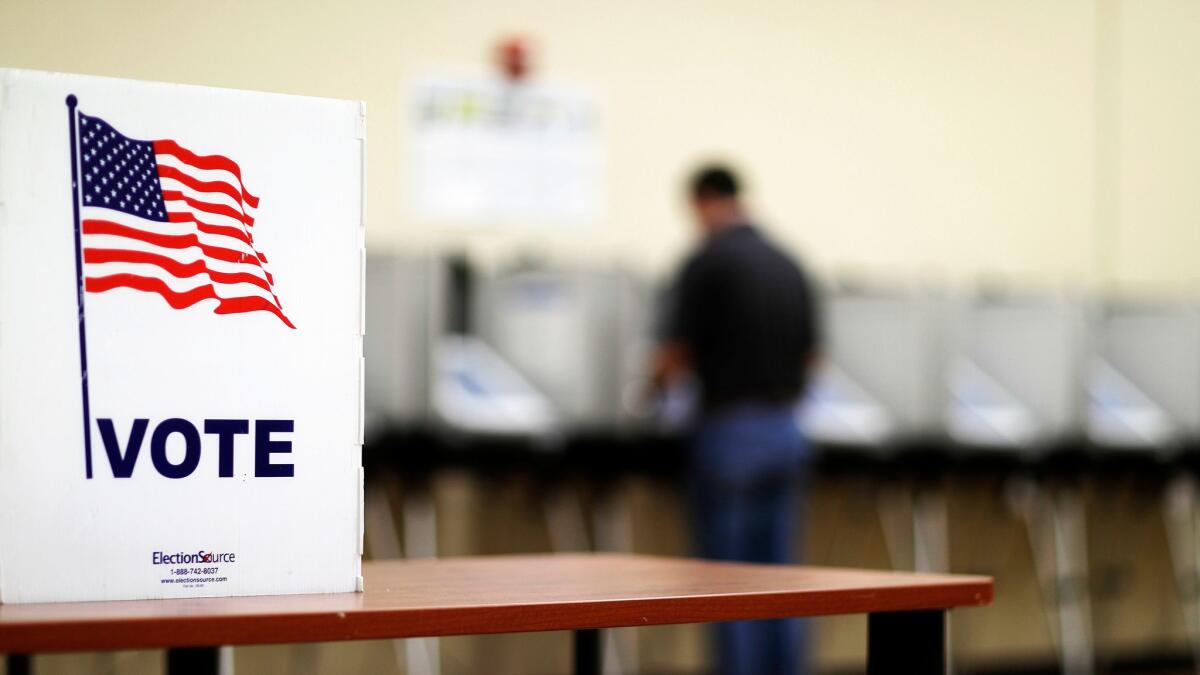Q&A: What you need to know about President Trump’s voter fraud commission

- Share via
The stated goal of
But so far the panel, which opponents have assailed as both a sham created by an insecure president and a tool to suppress votes, has faced strong pushback from Democrats and Republicans alike.
On Wednesday, the bipartisan commission held its first meeting in Washington to discuss the voting process and registration.
Here’s a look at the goals of the panel and some of the uproar it’s faced:
Why was the commission created?
In January, Trump — without evidence — said that between 3 million and 5 million illegal votes were cast in the 2016 presidential election. (Although Trump won the electoral college, he lost the popular vote to Hillary Clinton by nearly 3 million votes.) Trump’s comments were castigated by elections officials on both sides of the aisle, who questioned the validity of his allegations.
Even so, Trump vowed to look into voter fraud. In May, he issued an executive order creating a Presidential Advisory Commission on Election Integrity.
Is voter fraud widespread?
No. Nationwide studies have consistently shown that voter fraud is almost nonexistent.
A recent comprehensive investigation of voter fraud conducted by the Brennan Center for Justice, a public policy institute, found 31 credible instances between 2000 and 2014 of voter impersonation out of more than 1 billion votes cast. The study examined every federal election in that time period.
Trump, Pence defend voter fraud panel at first meeting »
Who is on the commission?
It consists of about a dozen current and former secretaries of state, clerk and recorders and judges.
Vice President Mike Pence serves as chairman, while Kansas Secretary of State Kris Kobach is vice chairman. (In recent years, Kobach, who is running to become governor of Kansas, has helped create some of the strictest voter ID laws in the country.)
Others on the panel include former Ohio Secretary of State Ken Blackwell, a Republican, and Maine Secretary of State Matthew Dunlap, a Democrat.
What has the panel done so far?
Nothing yet, but it’s just getting started.
Last month, Kobach sent a letter to top election officials in each state asking that they provide, among other things, voters’ names, addresses and the last four digits of Social Security numbers.
“It is crucial for the commission to consider your input as it collects data and identifies areas of opportunity to increase the integrity of our election systems,” wrote Kobach.
But dozens of secretaries of state pushed back against the request.
To date, 21 states and the District of Columbia have declined to provide any data, according to a tally by the Brennan Center. Others, citing state law, will provide some, but not all of the data requested.
What did secretaries of state say about the request?
Many of them called it unwarranted and cited state laws that prevent them from sharing some of the data. (Even Kobach announced that Kansas law forbade him from handing over Social Security numbers.)
Wyoming Secretary of State Ed Murray was among the Republican officials who rebuffed the commission’s request. Insisting he was going to “safeguard the privacy of Wyoming’s voters,” Murray said in a statement to The Times this month that the commission’s request “could lead to federal overreach.”
California Secretary of State
What has been the commission’s response?
Kobach has seemingly taken a page from Trump’s playbook.
In a statement issued days after he sent the letter to the secretaries of state, Kobach said that opposition to the commission was “fake news” and that the panel’s work was vital to enhancing election integrity.
“Despite media distortions and obstruction by a handful of state politicians, this bipartisan commission on election integrity will continue its work to gather the facts through public records requests to ensure the integrity of each American's vote because the public has a right to know,” he said.
Has that stopped opposition or lawsuits?
Not at all. The commission has faced a flurry of lawsuits.
The
In addition to EPIC lawsuit, the Lawyers Committee and the American Civil Liberties Union, among others, filed lawsuits this month over privacy concerns associated with commission. A federal judge ruled against the Lawyers Committee and the ACLU suits, but appeals are expected.
What is the commission’s end task?
It’s supposed to provide Trump with a written report.
When Trump created the commission in May he ordered its members to meet and collaborate with elections officials from all 50 states. Their work is expected to be completed by next year.
ALSO
Here's why a growing number of states are pushing back against Trump's voter fraud commission
President Trump says it's illegal to be registered to vote in two states — but he's wrong
Sign up for Essential California
The most important California stories and recommendations in your inbox every morning.
You may occasionally receive promotional content from the Los Angeles Times.








